CSR strategy (2017-2020)

PZU Group’s policies [Accounting Act]
[GRI 103-2, GRI 103-3]
The PZU Group runs its operations while adhering to the principles of ethics and responsible business conduct. Growth in the PZU Group’s value is pursued in consideration of the expectations and needs of the environment and a reasonable use of resources. The firm strives to manage many types of capital – financial, human, environmental and social – in a responsible and sustainable manner.
2020 was the last year when the Company pursued the “Corporate social responsibility strategy of the PZU Group for 2018–2020”. The strategy was the first document to organize key CSR activities at the management level. It defined ambitions, directions of activities and initiatives in reference to business and social challenges. The CSR strategy comprises issues related to clients, employees, environmental impact, risk management, social involvement and relationships with suppliers. Initiatives and indicators defined in detail in the strategy enable us to enhance our operating standards steadily across the spectrum of sustainable development, which is reflected in building value for the PZU Group’s stakeholders.
2020 brought a number of new challenges that were extremely hard to predict at the time of preparation of the document. The organization took various steps to align the strategic assumptions with the new reality. Despite the numerous changes in the business environment, the primary assumption of the CSR strategy remains valid: “We care about the future to help our clients”.
In this year’s report, the PZU Group summarizes the CSR strategy in its entirety, presenting the level of attainment of its objectives and describing the key initiatives pursued in respect of each commitment.
Commitments enshrined in the PZU Group’s CSR Strategy – objectives, initiatives
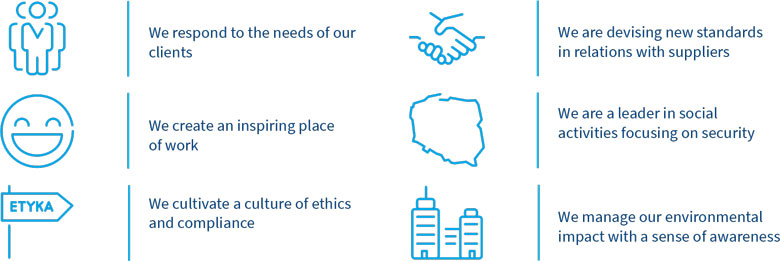
We respond to the needs of our clients
The PZU Group endeavors to be a stable and trustworthy partner for its clients. To this end, it builds long-term relationships with them and responds to their changing needs.
These assumptions are pursued in PZU and PZU Życie under the formula known as the client experience management program. Client opinions and satisfaction level are monitored on an ongoing basis, in particular by running satisfaction studies on service and products and by examining complaints. Client experience maps are prepared to identify which elements of service are in need of repair.
Status of the execution of the strategic assumptions [IIRC]:
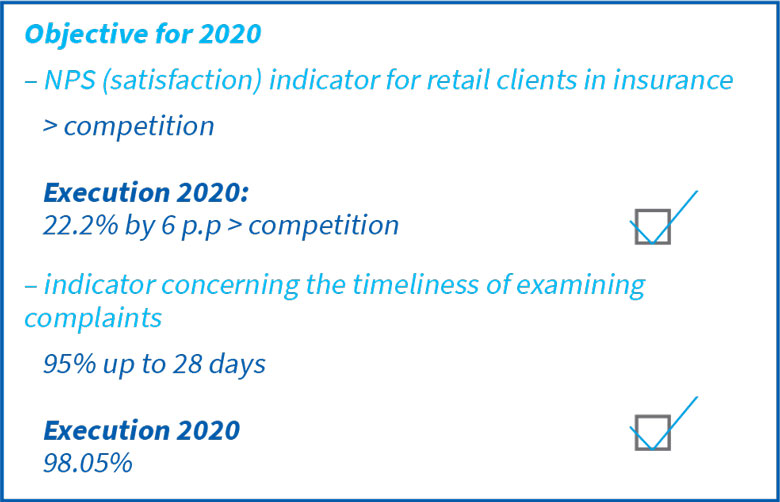
Clients were once again inclined to recommend PZU to a greater extent in 2020 in comparison to the competition. Its NPS (Net Promoter Score) was 6 p.p. higher than the competition’s. This score is to a large extent the outcome of actions taken after client satisfaction studies enabling us to identify the organization’s strengths and areas in need of modification and improvement.
The set objective was successfully pursued from the launch date of the new CSR strategy for 2018–2020. The NPS achieved in both 2018 and 2019 was significantly higher than the competition’s.
Since the launch of the independent market ranking “Institution of the Year”, PZU has been ranked first among insurers in the “Quality of service in the outlet” and “Quality in remote contact channels” categories. These achievements confirm that the customer service standards adopted by the organization are fitting and have gained the highest recognition. Another outstanding achievement of 2020 was also the first place in the category announced on the occasion of the 5th anniversary of the contest: “Best Insurer”.
In 2020, PZU also endeavored to deliver top performance in terms of the timely handling of complaints. The share of complaints handled within 28 days kept increasing gradually to over 98%, which meant that the goals set in the strategy were exceeded. Half the number of complaints were handled within 14 days of being reported.
We create an inspiring place of work
The PZU Group is striving to be the best employer on the markets where it renders services. Its objectives are as follows:
- being in the leadership position among the financial industry companies most frequently selected by people looking for employment;
- having highly committed and best personnel on the market;
- low turnover of the most talented people in the organization.
Steps taken by the PZU Group to achieve the foregoing objectives:
- ensuring transparent career paths;
- enabling the professional development of employees;
- promoting entrepreneurship, innovation and team work;
- building a higher quality of the organizational culture;
- counteracting employee attrition;
- developing a program to retain key employees;
- creating a friendly environment and atmosphere and developing opportunities, while at the same time guaranteeing respect for life-work balance.
Status of the execution of the strategic assumptions [IIRC]:
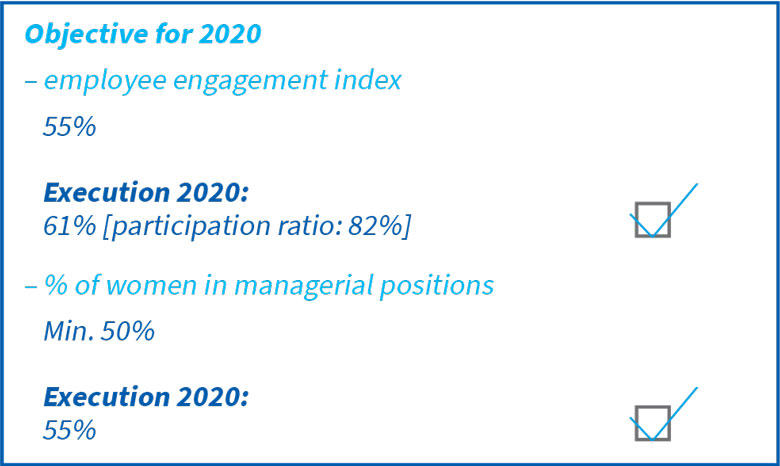
In 2020, the employee engagement index increased by 10 p.p. y/y and reached 61% with an 82% participation ratio (84% in 2019).
Since 2018, the share of women in managerial positions has been on the rise. In 2018, women accounted for 53.1% of management, in 2019 – 53.5%, and in 2020 – 54.8%.
Key initiatives that contributed to the successful attainment of the assumed indicators:
- rapid development of online forms of professional improvement – webinars and conferences were available to all employees, regardless of area or position, which for several years has been translating into an increase in the availability of various development opportunities for employees;
- exchange of managerial experience within on the #Management Lab platform with the participation of inhouse and third-party experts; in particular focused, on developing employee engagement;
- educational program #DobryStan (#WellBeing) serving the purpose of building high efficiency and mental resilience; psychological support was also provided over a hotline as part of the program;
- development of a new model of work organization to accommodate the changes – deployment of a hybrid model, support in changing the habits and methods of doing work with a view to maintaining the efficiency of work under the new model;
- ongoing dialogue with employees – conducting “pulse checks” on current needs and received support, especially during the pandemic.
These initiatives contributed to a decrease in the employee attrition rate in the first year of employment. In 2020, it stood at 0.38%, which was below the assumed maximum level of 0.5%. At the same time, the percentage of employees with more than 10 years of work in the PZU Group was 51.1%, which was above the assumed minimum level of 45% for 2020.
Status of the execution of the strategic assumptions [IIRC]:
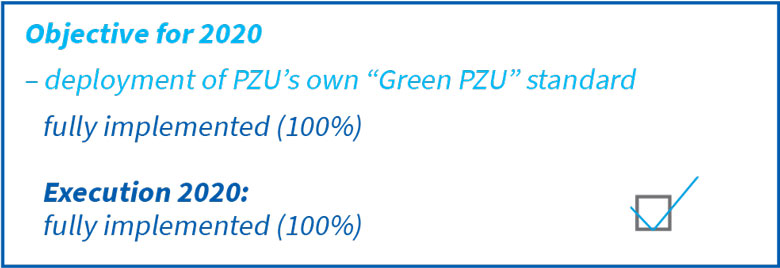
The PZU Group’s business operations are based on a reasonable approach to the use of natural resources and curtailing its adverse environmental impact in compliance with the applicable legal requirements and established market standards. The Group pursues this objective consistently, by applying a long-term outlook. On 5 November 2018, the Management Board adopted a resolution whereby it put in place a PZU Group Standard document entitled “Green PZU” along with guidelines for planned deployments in the areas of administration and real estate. The purpose of this document is to harmonize the PZU Group’s activities in the area of conscious environmental management and to minimize its adverse environmental impact.
Environmental initiatives pursued in 2020 under the Green PZU standard:
- ograniczanie zużycia materiałów biurowych;
- curtailing the consumption of office supplies;
- reducing the volume of hard-copy documentation;
- recycling of used assets;
- collaboration in the area of asset disposal with companies that have adopted the highest environmental protection standards;
- environmentally friendly activities in the car fleet management policy;
- curtailing the consumption of utilities, including electricity, water and heat;
- conducting rational waste management;
- installing air conditioning with an ecological cooling agent;
- preferring environmental and social aspects when choosing space for rent.
A major initiative in the environmental area is the promotion of environmentally friendly behaviors among employees.
In 2018-2020, a number of educational campaigns were conducted to raise the environmental awareness among employees and promote environmentally friendly behaviors both at work and at home. Events such as the Water Day, the Earth Hour, the Earth Day and the Environmental Protection Day have become undeviating elements of the PZU and PZU Życie calendar of events. In 2020, on the occasion of the Global Day of Action for Sustainable Development, the “SDG (Sustainable Development Goals) Challenge contest, i.e. how PZU may stimulate sustainable development?” was organized for employees to come up with innovative business ideas. PZU Group employees shared as many as 57 ideas responding to the contest challenge.
We cultivate a culture of ethics and compliance
The risks inherent in PZU’s business are covered by the risk management system established on the basis of the following four levels of authority: the Supervisory Board, the Management Board, committees and the level of operational activities broken down into three lines of defense.
As regards compliance risk, a modern compliance function has been established in the PZU Group based on best market standards and internally developed compliance solutions and tools.
We are a leader in social activities focusing on security
Insurance companies are responsible for the risks of other persons. That is why social engagement among insurers takes on special meaning. For many years the PZU Group has taken specific and measurable efforts to attenuate risk at source by using the prevention fund.
On top of sponsoring activity or the charitable activity of the PZU Foundation, the PZU Group gets involved in social investments to reduce risk and simultaneously produce business and social benefits. These initiatives’ major objective is to prevent accidents, reduce their repercussions and support those activities that advance health prevention.
The strategic pillars underpinning PZU’s social involvement are as follows: safety (road and public safety, at the local level), health, culture and participation in major industry events in the capacity of an expert.
Status of the execution of the strategic assumptions [IIRC]:
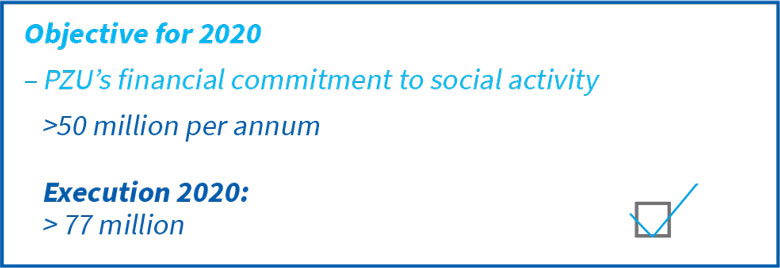
Financial commitment to social activity in 2020 surpassed PLN 77 million (PZU, PZU Życie, TUW PZUW and the PZU Foundation). In 2019, it was over PLN 84 million, and in 2018 – over PLN 86 million.
We are devising new standards in relations with suppliers
PZU has an awareness of its material impact on the procurement market and its responsibility for shaping the top business standards. The PZU Group companies advance the idea of corporate social responsibility in relations with their suppliers, cooperating only with business partners who observe human rights and act in compliance with legal regulations, in particular with regard to the prevention of corruption. They also expect their partners to provide safe and dignified work conditions, apply the highest ethical standards and care for the natural environment.
Status of the execution of the strategic assumptions [IIRC]:
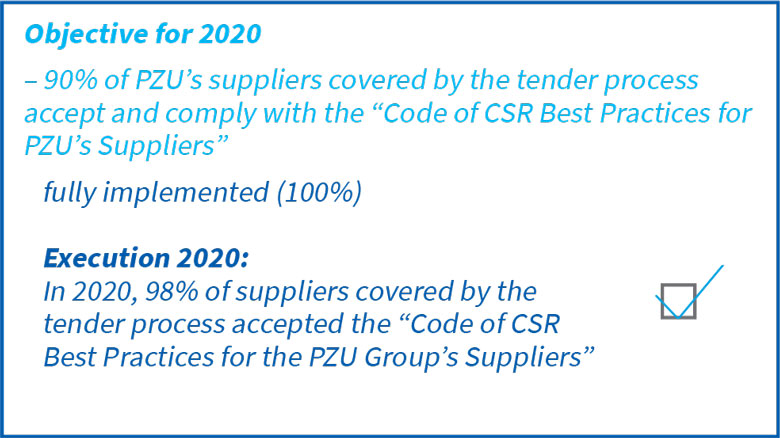
The “Code of CSR Best Practices for the PZU Group’s Suppliers” was developed in 2018 and came into force in 2020. Every company interested in cooperation with PZU and PZU Życie is required to familiarize itself with this document, and compliance with its provisions by the business partners is incorporated into the respective contracts. The submission of a representation on the supplier’s knowledge of the Code and acceptance of its provisions is an indispensable element of business proposal documentation.
Governance – we are building our CSR position in the industry
The actions taken in this area concentrate on formulating the CSR policy within the PZU Group, defining objectives and strategic metrics and tending to the active implementation of planned efforts.
Governance initiatives call for coordinating ventures and duties discharged by all the PZU Group companies. Every year the “PZU Group’s non-financial report” is drafted. Its membership until the end of 2019 in the Respect Index, a stock index consisting of companies espousing corporate social responsibility, which at the beginning of 2020 was replaced by a new index called WIG-ESG, also makes it possible to render an accurate and objective evaluation of the Group’s CSR activities.
The Group’s ambition is to ensure efficient and comprehensible internal communication regarding CSR-related values, objectives and practices. This should provide for appreciation of the planned activities and support from persons and units guaranteed in the execution of the CSR strategy.
Until 2020, the Sponsorship, Prevention and CSR Committee was responsible for coordinating the pursuit of the CSR strategy and the assessment of achievements in the corporate responsibility area. The Committee was in charge of ensuring the correct execution of PZU and PZU Życie’s sponsorship, prevention and corporate social responsibility activities and supervision over these areas.
The key assignments of the Committee included:
- examination of applications for the execution of national and local prevention or sponsorship projects with a value exceeding a certain threshold amount;
- ongoing monitoring of the execution of prevention or sponsorship projects;
- supervising the execution of CSR projects.
Strategic plans for 2021–2024
In response to the challenges faced by business, including by companies operating in the insurance and financial sectors, and prompted by the expectations of a broad range of stakeholders, in 2020 the Group began work on the ESG Strategy for the coming years. At the end of the first quarter of 2021, the new document will replace the existing CSR strategy. In its new strategic directions, the Group focuses on aspects related to environmental protection (and climate change), social commitment and corporate governance (ESG). As the largest insurance group in the region, the PZU Group seeks to establish a sustainable organization demonstrating a transparent approach to sustainable development. With a view to creating a responsible organization under the new strategy, as part of the subsequent work defined in the Sustainable Development Strategy, the PZU Group will strive to incorporate even more comprehensively climate-related factors in processes used to manage the various categories of risk.
This approach will permit the making of decisions supporting sustainable development in the context of the products being offered, cooperation with business partners, care for the well-being of employees and local communities, and building value-based leadership.
[GRI 102-20]
The newly established Sustainable Development Department will be put in charge of the coordination of activities under the new strategy. The Department will report directly to the PZU Group Director/PZU Życie Management Board Member responsible for the sustainable development area.
